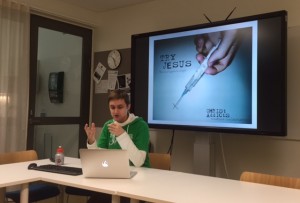On November 24, Igor Mikeshin, a sociocultural anthropologist and a PhD candidate at the University of Helsinki, gave a presentation at the CEACG seminar. The presentation was titled “Cheap Dope, 2-2-8, and Jesus: Anthropology of Substance Abuse in Russia” and it covered the anthropology of substance abuse, substance use dependence in the present-day Russia as a field of social research, and Mikeshin’s current and future research.
The main part of his talk was dedicated to the Russia as a case for studying substance abuse. Russia is, at the same time, a typical and very specific example of a “drug war.” One of the world leaders in heroin consumption, Russia pursues an “anti-narcotic policy” of prohibitions, police force, and tight control. Such policy actually makes the situation worse in many respects. For instance, severe persecution on heroin sales and distribution leads to its higher price and forces addicts to use cheaper substitutes, much more harmful and dangerous. Strict regulations and bans also deeply affect palliative care and veterinary medicine, reducing pain-killer opiates to the very minimum, which often causes tragic circumstances. Criminal legislature treats drug-related crimes with severe penalties and long prison terms, hence about 20% of Russian prison population have been convicted under the drug-related 228 article of the Criminal Code. The number 228 even became a cultural meme, very popular in street fashion, rap music, and internet.
The anti-narcotic policy of the Russian government is populist. It is based on popular support, and it creates this support by significantly reducing any information and education on the nature of substance abuse and features of drugs, labelling and censoring them as “propaganda.” The popular support of harsh persecutions of people involved in drugs is manifested in stigmatization of addicted people. They are commonly claimed immoral, weak-willed offenders, subjects to punishment and correction. The addicts are considered fully responsible for their habit, and the fact that the vast majority of abusers in Russia become dependent long before the legal age is not taken into account. Addiction treatment is mostly represented by state “narcology,” which totally prohibits substitute therapy and predominantly focuses on physical dependence and detoxication, regarding physical aspect as deviation or immorality.
For his PhD work, Mikeshin conducted an ethnographic study of the Russian Baptist rehabilitation ministry for the addicted people, where I studied a phenomenon of Christian rehabilitation. This method stresses a moral transformation from an addicted sinner to a Christian believer, which gives an addict a sufficient psychological basis and motivation to maintain a prolonged remission. This phenomenon is a very much unique narrative of biblical literalist conversion, in the context of 150 years of Evangelicals in Russia, surviving in isolation, oppression, and marginalization, developing particular kind of dogmatics, based on linguistic discourse of the Russian Synodal translation of the Bible.
Igor Mikeshin’s future research plans include an ethnographic study (funding application is pending) of two Russian-speaking border regions of EU. In Lappeenranta (Finland) and Narva (Estonia) the rates of substance abuse are very high. He plans to investigate the cultural and political impact of Russian anti-narcotic policy and “junkie” culture towards the border regions, and stigmatization and self-stigmatization of addicts, especially in the context of their minority status.
Email: igor.mikeshin [at] helsinki.fi
Website: http://helsinki.academia.edu/IgorMikeshin

